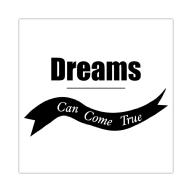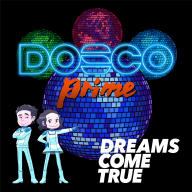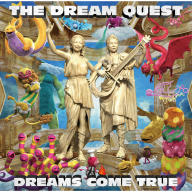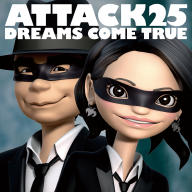In 1993 Dreams Come True expanded to America, debuting in Hollywood with the tune Winter Song, which they provided for the classic rom-com #Sleepless in Seattle. It was followed by the slightly strange stunt of a Japanese band doing the theme for an American cartoon instead of anime (the flick in question being #The Swan Princess [1994], with the song Eternity). Dreams Come True also wrote music for TV shows in both Japan and the U.S., their American employment coming mainly via Disney. In 1995, Yoshida recorded the acclaimed solo album Beauty and Harmony with sax player Michael Brecker, as well as David Walker and Chuck Rainey, who had worked with Aretha Franklin (Yoshida's Time feature came in 1996). She also starred in a number of commercials, including ads for Sony, Vodaphone, and Coca-Cola, while Masato wrote scores for *Sonic the Hedgehog games and dabbled in ad jingles himself (in the 2000s he returned to video games, contributing some DCT songs for the *Dance Dance Revolution series). The band also released the double-platinum albums Delicious (1995) and Love Unlimited (1996).
By the second half of the '90s, expectations were running high. Dreams Come True were wooed away by Virgin for the alleged sum of $25 million, which was meant to pay off after the band scored big in North America (they switched from Sony to Toshiba-EMI in Japan). Dreams Come True re-recorded a bunch of their old songs in English for the 1998 album Sing or Die, which came out in the States but failed there, ending dreams of conquering the Billboard charts. Meanwhile, the Oricon charts remained more susceptible to their crooning -- Sing or Die went gold in Japan, and The Monster (1999) went platinum. In 2001 the band debuted in Taiwan, playing for a crowd of 25,000, and took part in a number of charity events, including a stint with Ryuichi Sakamoto.
Still, the start of the 2000s turned out to be a tough time for Dreams Come True. Although Monkey Girl Odyssey (2001) climbed to number one, their sales dropped. In 2002 Takahiro quit the band, only to be busted for drugs several months later, and in the same year Virgin and EMI sacked them from their rosters. However, Dreams Come True survived by going indie for a while, releasing the single It's All About Love on their own label, DCT Records (2002). They didn't stay self-employed for long, being picked up by Universal, which released their English-language album Love Overflows (2004), consisting mainly of remakes of their old Japanese hits. After that the band confirmed its return to normal operating mode with the "comeback" studio full-length Diamond 15, which charted at number two, and participation in a Live 8 concert in 2005. The Love Rocks (2006) brought the band back to the top of the album charts for the first time since 2001. The 2007 studio effort And I Love You stopped at the second place in the charts, and in 2008 the band also had its first number one single in years with Tsuretette Tsuretette, which set the stage for the album Do You Dreams Come True?, scheduled for a March 2009 release. ~ Alexey Eremenko, Rovi


















